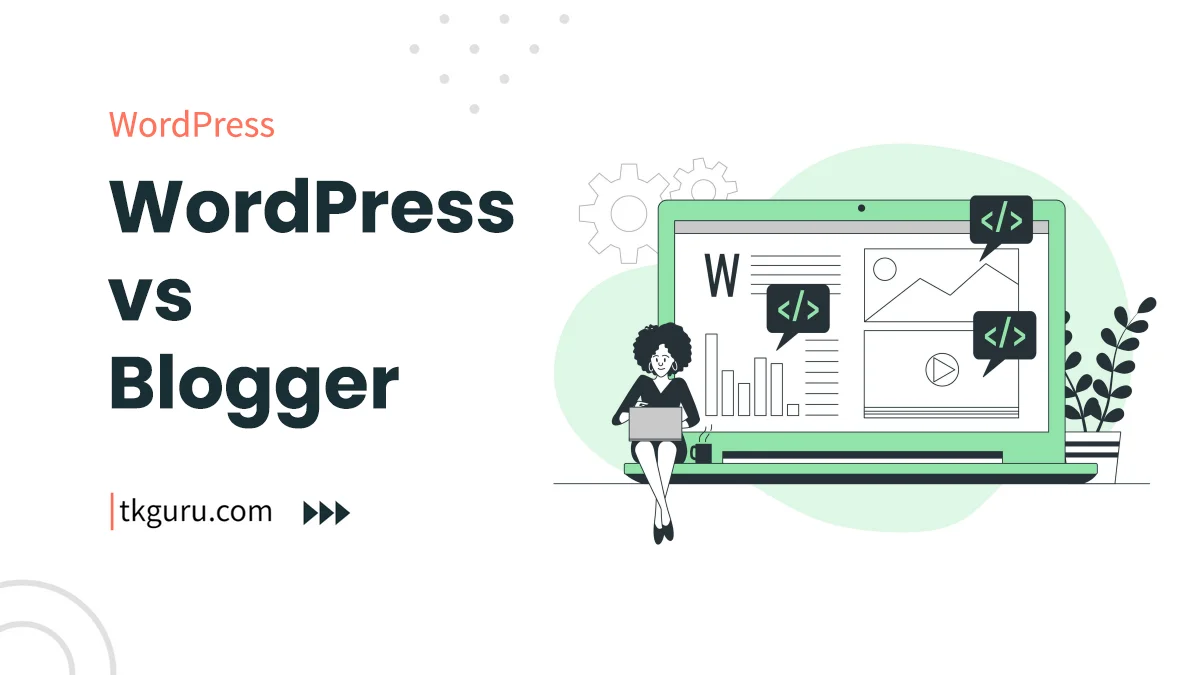Advertisements
Ratings
“Which is better WordPress or Blogger?
What are the advantages and disadvantages of WordPress?
What are the advantages and disadvantages of Blogger?
The article below has answers to all your questions.
Please read this article carefully.”

WordPress v/s Blogger – New users often ask us why should we use WordPress instead of Blogger? In this article, we will compare WordPress and Blogger which will help you to decide which is better for your requirement.
We will cover all the WordPress v/s Blogger pros and cons here so that you can make the right decision when you want to choose WordPress or Blogger as a platform for your website.
Note: Right now two versions of WordPress are available, one is wordpress.com and the other is wordpress.org.
There is wordpress.com with free hosting and another wordpress.org for which you will have to take separate hosting. We will talk about self-hosted WordPress.org and Blogger in this article.
WordPress and Blogger are two of the most popular blogging platforms available today. Both platforms have their advantages and disadvantages, and the choice between them depends on your specific needs and goals.
Contents
- 1. WordPress vs. Blogger
- 2. The Pros and Cons of WordPress and Blogger for Blogging
- 3. Migrating from Blogger to WordPress: A Step-by-Step Guide
- 4. How to Choose Between WordPress and Blogger for Your Blog
- 5. WordPress vs. Blogger: Which One is More SEO-Friendly?
- 6. The Differences Between WordPress.com and WordPress.org
- 7. WordPress vs. Blogger: Which One is Easier to Use?
- 8. Comparing WordPress and Blogger for Monetizing Your Blog
- 9. How to Import Your Blogger Blog to WordPress
- 10. A Comprehensive Comparison of WordPress and Blogger Features
- Conclusion
- WordPress v/s Blogger FAQs
1. WordPress vs. Blogger
Here’s a comparison of WordPress and Blogger to help you decide which platform is right for you:
1.1 Ownership
Blogger is a blogging service provided by Google and it is completely free and there is a lot to publish your data on the Internet.
But you are not the owner of Blogger, Google runs this service and has the right to stop it, or Google can stop your access to Blogger at any time. In simple language, the owner of the blog created on Google is Google and not you.
With WordPress, you use a WordPress hosting provider to host your own website. You are free to decide when you want to run it and when you want to turn it off, you are the owner of all your data.
You can also transfer your website’s data to another hosting whenever you want. In simple language, you are the owner of the website built on WordPress.
1.2 Control
Blogger is a very well designed service by Google which provides you very limited tools, so that you can do only specific tasks on your website.
Options are limited in your blogspot blog. You cannot increase them according to your need. If you want to add something extra according to you, then it is not possible in blogspot blog.
WordPress is an open source software, so you can easily extend its features by adding new plugins.
There are thousands of WordPress plugins that provide you the facility to modify and extend the default feature setup, such as adding a store to your website, creating a portfolio, adding a photo gallery, adding extra security, adding a Google map, etc.
By using Plugins in WordPress, you can make many changes to your website without coding.
1.3 Look
Blogger by default provides a limited set of templates to use. You can modify the colors and layout of these templates using Blogger’s tools, but you cannot create or modify your own layout.
With WordPress, you can access thousands of free and premium WordPress themes that help you create a professional looking website.
A WordPress theme is available for every type of website, you will get it for free from the WordPress directory according to the topic of your website, which can be easily modified and customized.
Like if you want to make a website for your online store then choose e-commence theme, if you want to make a website for education then choose education theme, if you want to make a website for videos then choose video theme. You will find themes on almost every subject / topic with WordPress.
1.4 Transfer
Moving your website from Blogger to a different platform is a complicated task. A major risk is that you will lose your SEO (search engine rankings), subscribers and followers in the meantime. Although blogger gives you permission to export your content.
Using WordPress, you can transfer your website anywhere. You can move your WordPress website to a new host, change the domain name, or even transfer your website to another content management system.
1.5 Cost
Blogger is a free service. It is provided by Google for creating blogs and blogging. Basic designs for Blogger blogs are free and your website name is free with blogspot.com extension.
If you want to buy a modified domain through Google Domains or want to add any special design and features to the blog, then you will have to pay for it.
If your blog becomes popular and gets a lot of traffic, then you do not have to worry about server crash because Google hosting service will handle it very well.
WordPress is usually self-hosted. The core files of WordPress are free and there are many free themes that you can use to give your website a new look.
You have to pay some money to the hosting provider company for hosting your WordPress website.
1.6 SEO
WordPress is generally considered better for SEO than Blogger, as it offers more flexibility and customization options.
With WordPress, you can optimize your blog for search engines by using plugins like Yoast SEO.
Blogger has limited SEO options, and you have to rely on Google’s algorithms to rank your blog.
1.7 Privacy
Blogger allows setting the entire blog to private or only approved readers. If you want to publicly restrict any portion of your blog and do not want to hide the whole thing, then it is not possible in Blogger.
With WordPress, you can choose this option post-by-post. WordPress allows you to set each post to private or only approved readers.
1.8 Security
By using Blogger, you can get the additional advantage of Google’s secure platform. You don’t need to manage the resources of your server, you don’t even need to worry about securing your blog or creating backups.
WordPress is very secure, but since it is self hosted, you are responsible for its security and backup. There are many WordPress plugins available that can help you with this, such as Wordfence Security, iThemes Security, Sucuri Security, BulletProof Security etc.
1.9 Support
Limited support is available for Blogger. They have a very basic documentation and user forum. If we talk about Google’s blogger, then in the form of support, the choices for you are very limited.
WordPress has a very active community support forums. Where you can get help from experienced WordPress users and developers.
Online documentation is also available, with the help of which you can understand WordPress yourself.
Apart from community support, many companies are offering premium support for WordPress.
1.10 Future
No major update has been seen in Blogger for a very long time. The future of Blogger depends on Google, and they have the right to shut them down whenever they want.
WordPress is an open source software which means that its future does not depend on one company or individual.
It is developed and maintained by a community of users. Being the world’s most popular content management system, thousands of businesses around the world depend on it. The future of WordPress is bright and assured.
2. The Pros and Cons of WordPress and Blogger for Blogging
WordPress and Blogger are both popular blogging platforms that offer various pros and cons. Here are some of the pros and cons of using each platform:
WordPress:
Pros:
- Highly customizable: WordPress offers thousands of themes and plugins that can be used to customize the appearance and functionality of your blog.
- Greater control: WordPress offers greater control over your blog compared to Blogger. You can host your blog on your own server and have complete control over your content.
- SEO-friendly: WordPress is highly SEO-friendly and has built-in features that make it easier to optimize your blog for search engines.
- Large user community: WordPress has a large user community, so there are many resources available online to help you with any questions or issues you may have.
Cons:
- Steep learning curve: WordPress has a steeper learning curve compared to Blogger, especially if you’re new to website building.
- Requires hosting: You’ll need to purchase hosting to use WordPress, which can be expensive, especially if you need advanced features or a high traffic website.
Blogger:
Pros:
- Easy to use: Blogger is easy to use and doesn’t require any technical skills to set up and use.
- Free to use: Blogger is completely free to use and offers unlimited storage and bandwidth.
- User-friendly interface: Blogger’s interface is straightforward and easy to navigate.
- Integrated with Google: Blogger is integrated with Google’s suite of services, including Google AdSense, which makes it easy to monetize your blog.
Cons:
- Limited customization: Blogger offers limited customization options, so it can be challenging to create a unique look and feel for your blog.
- Limited control: Since Blogger is hosted on Google’s servers, you have limited control over your content.
- Limited support: While there are resources available online, Blogger’s user community is smaller than WordPress’s, so it may be harder to find help if you need it.
- Limited SEO options: Compared to WordPress, Blogger offers limited SEO options, so it can be more challenging to optimize your blog for search engines.
In conclusion, both WordPress and Blogger have their advantages and disadvantages. If you’re looking for a highly customizable platform with more control over your content, WordPress may be the better option.
However, if you’re looking for an easy-to-use platform that’s free to use and doesn’t require any technical skills, Blogger may be a good choice. Ultimately, the best platform for you depends on your specific needs and goals.
3. Migrating from Blogger to WordPress: A Step-by-Step Guide
If you’ve decided to switch from Blogger to WordPress, here is a step-by-step guide on how to migrate your blog:
- Set up a WordPress website: First, you’ll need to set up a self-hosted WordPress website with a web host. You can use a hosting provider like Bluehost, SiteGround, or WP Engine. Once you’ve signed up for a hosting plan, install WordPress on your new website.
- Export your Blogger content: In your Blogger dashboard, go to the Settings > Other section, and click on the “Export blog” button. Save the exported file to your computer.
- Import your Blogger content to WordPress: In your WordPress dashboard, go to Tools > Import, and select “Blogger.” Follow the instructions to connect your Blogger account and import your content.
- Redirect your Blogger traffic to your WordPress website: To make sure your readers are redirected to your new website, you’ll need to set up a redirect from your Blogger site to your WordPress site. You can do this by adding a code snippet to your Blogger site’s header section or by using a plugin like “Blogger to WordPress Redirection.”
- Set up your WordPress website: Once your content is imported, you can start setting up your WordPress website. Choose a theme, customize your website’s appearance, and install any necessary plugins.
- Set up your permalinks: Your permalinks determine the structure of your website’s URLs. In WordPress, you can customize your permalinks by going to Settings > Permalinks.
- Configure your settings: In your WordPress dashboard, go to Settings > General and configure your website’s settings, including the site title, tagline, and time zone.
- Install necessary plugins: Install any necessary plugins, such as Yoast SEO, to optimize your website for search engines.
- Test your website: Once your website is set up, test it to make sure everything is working properly. Check your website’s pages, posts, and media files to make sure they’ve been imported correctly.
- Launch your new website: Once you’ve tested your website and are satisfied with how it looks, it’s time to launch your new website! Make sure to update any links to your old Blogger site with your new WordPress site’s URL.
Migrating from Blogger to WordPress can be a bit daunting, but by following these steps, you can make the process as smooth as possible.
4. How to Choose Between WordPress and Blogger for Your Blog
When choosing between WordPress and Blogger for your blog, there are a few factors to consider:
- Your technical skill level: If you’re comfortable with technical tasks like hosting, installing plugins, and customizing your blog’s appearance, then WordPress might be a better choice for you. If you prefer a simpler, more user-friendly platform, Blogger might be a better fit.
- Your blog’s goals: Think about what you want to achieve with your blog. Do you want to monetize it? Build a strong brand? Establish yourself as an authority in your field? Depending on your goals, one platform may be better suited to your needs than the other.
- Customization options: Consider how much control you want over the appearance and functionality of your blog. WordPress offers a wide range of customization options, including thousands of themes and plugins. Blogger, on the other hand, has more limited customization options.
- SEO: If you’re concerned about search engine optimization (SEO), WordPress is generally considered more SEO-friendly than Blogger. WordPress has built-in features that make it easier to optimize your blog for search engines, while Blogger has more limited SEO options.
- Cost: While Blogger is free to use, WordPress requires a hosting plan and some paid themes and plugins. Consider how much you’re willing to spend on your blog.
Ultimately, the best platform for your blog depends on your specific needs and goals. If you’re looking for a highly customizable platform with more control over your content, WordPress may be the better option.
However, if you’re looking for an easy-to-use platform that’s free to use and doesn’t require any technical skills, Blogger may be a good choice. Consider these factors carefully before making your decision.
5. WordPress vs. Blogger: Which One is More SEO-Friendly?
When it comes to SEO-friendliness, WordPress is generally considered to be more SEO-friendly than Blogger. Here are a few reasons why:
- Customization options: WordPress offers a wide range of customization options, including the ability to optimize your site’s metadata, add tags and categories, and install SEO plugins like Yoast SEO. These customization options can help you optimize your site for search engines and improve your search rankings.
- Site structure: WordPress has a more flexible site structure than Blogger, which allows for more SEO-friendly design and navigation. You can create custom menus, add internal links, and optimize your site’s URLs, all of which can help improve your SEO.
- Plugin options: WordPress has a vast library of plugins that can help you improve your site’s SEO, from keyword research and analysis to XML sitemap generation and link management. These plugins can help you automate many of the SEO tasks that would otherwise require technical skills and knowledge.
- Site speed: Site speed is a critical factor in SEO, and WordPress sites tend to be faster than Blogger sites. This is because WordPress has a wide range of caching and optimization plugins that can help improve your site’s speed and performance.
While Blogger does have some basic SEO features, such as the ability to add tags and categories and optimize your site’s description, it is generally less SEO-friendly than WordPress.
If SEO is a priority for your blog, you may want to consider using WordPress to take advantage of its extensive customization options, plugin library, and site structure.
6. The Differences Between WordPress.com and WordPress.org
WordPress.com and WordPress.org are two different platforms, despite sharing the same name. Here are the main differences between the two:
- Hosting: WordPress.com is a fully hosted platform, which means that your website is hosted on WordPress.com’s servers. WordPress.org, on the other hand, is a self-hosted platform, which means that you need to find your own web hosting provider to host your website.
- Customization: WordPress.com limits your ability to customize your website by offering a limited set of themes and plugins. With WordPress.org, you have complete control over your website’s customization options and can choose from thousands of themes and plugins to make your site unique.
- Monetization: WordPress.com has strict limitations on how you can monetize your website, including restrictions on ads and affiliate marketing. With WordPress.org, you have complete control over how you monetize your site and can use ads, affiliate marketing, and other monetization methods.
- Cost: WordPress.com offers free and paid plans, with varying levels of features and customization options. With WordPress.org, the software itself is free, but you will need to pay for web hosting and any premium themes or plugins you choose to use.
- Maintenance: With WordPress.com, all updates and maintenance are taken care of for you. With WordPress.org, you are responsible for maintaining and updating your website, including security updates, backups, and software upgrades.
Overall, WordPress.org offers more flexibility, control, and customization options, but requires more technical knowledge and responsibility.
WordPress.com is a simpler and more user-friendly platform, but comes with more limitations and less control over your website.
7. WordPress vs. Blogger: Which One is Easier to Use?
Both WordPress and Blogger have their own strengths when it comes to ease of use.
Blogger is a simpler platform with a user-friendly interface that is easy to navigate, especially for beginners.
It has a basic set of features that are easy to use, and you can quickly set up a blog without any technical skills or experience.
Blogger is also a fully hosted platform, which means you don’t need to worry about web hosting or maintenance.
WordPress, on the other hand, has a steeper learning curve and requires some technical skills, but it also offers more advanced customization options and features.
There are thousands of themes and plugins available that allow you to create a unique and professional-looking website.
WordPress also has a large community of users and developers who offer support, resources, and tutorials to help you get started.
While WordPress may be more complex to use than Blogger, it offers more flexibility and customization options, which can make it easier to achieve your desired results in the long run.
Ultimately, the platform you choose will depend on your individual needs and preferences.
8. Comparing WordPress and Blogger for Monetizing Your Blog
Both WordPress and Blogger offer a variety of ways to monetize your blog, but there are some differences to consider:
- Advertisements: WordPress allows you to easily add advertisements to your blog through third-party ad networks like Google AdSense or directly with advertisers. With Blogger, you can also add ads using AdSense, but the platform has more limitations and restrictions on ad placements.
- Affiliate marketing: Both WordPress and Blogger allow you to earn money through affiliate marketing, which involves promoting other people’s products and earning a commission on sales made through your unique affiliate link. However, WordPress offers more options for affiliate marketing, including the ability to use third-party affiliate networks and plugins that can help automate the process.
- E-commerce: WordPress offers many e-commerce plugins like WooCommerce, which makes it easy to sell physical and digital products directly from your website. Blogger doesn’t offer e-commerce features natively, and it can be difficult to integrate third-party solutions.
- Membership and subscription: WordPress offers a range of plugins and tools for creating membership and subscription-based content, which can help you generate recurring revenue from your blog. With Blogger, you’ll need to use third-party solutions, which can be more difficult to integrate and customize.
- Donations and sponsorships: Both platforms allow you to accept donations and sponsorships from your readers, but WordPress offers more flexibility and customization options for adding donation and sponsorship buttons to your site.
Overall, WordPress offers more options for monetizing your blog, especially when it comes to.
9. How to Import Your Blogger Blog to WordPress
To import your Blogger blog to WordPress, follow these steps:
- Sign in to your WordPress account and go to the dashboard.
- Click on “Tools” from the left-hand menu, and then click “Import.”
- Scroll down and click on “Blogger.”
- You’ll be prompted to install the “Blogger Importer” plugin. Click “Install Now” and follow the prompts to install the plugin.
- Once the plugin is installed, click on “Activate Plugin and Run Importer.”
- You’ll need to connect your Blogger account to WordPress. Follow the prompts to sign in to your Google account and authorize the connection.
- Select the Blogger blog you want to import to WordPress.
- Choose what to import, such as posts, pages, comments, and media.
- Click on the “Submit” button to start the import process.
- The importer will display the progress of the import. Depending on the size of your blog, this could take a few minutes to several hours.
- Once the import is complete, you’ll see a message that says “Import complete!” Click on the “View Results” button to see the imported content.
- Review your imported content to make sure everything looks correct. You may need to adjust some settings or formatting to make sure everything looks good.
That’s it! You’ve successfully imported your Blogger blog to WordPress. Keep in mind that some things may not transfer over perfectly, such as formatting, images, and other media. You may need to do some manual adjustments to make sure everything looks right.
10. A Comprehensive Comparison of WordPress and Blogger Features
Here is a comprehensive comparison of features between WordPress and Blogger:
- Hosting: Blogger is a fully hosted platform, which means your blog is hosted on Google servers. With WordPress, you can choose between self-hosted and hosted options.
- Customization: WordPress offers more customization options with thousands of themes and plugins available, allowing you to create a unique website. Blogger has limited customization options, and you can only customize the blog to a certain extent.
- Ease of use: Blogger is easy to use, especially for beginners, with a simple interface and basic features. WordPress has a steeper learning curve and requires more technical skills, but offers more flexibility and advanced features.
- SEO: WordPress offers more SEO-friendly features, including SEO plugins, optimized URLs, and better control over meta descriptions and tags. However, Blogger has basic SEO features, and you can still optimize your blog with proper keyword usage and meta tags.
- Monetization: Both platforms offer opportunities for monetization, but WordPress offers more flexibility and control with more options for advertising, affiliate marketing, and selling products and services.
- Security: WordPress has more advanced security features, such as two-factor authentication and automatic updates. Blogger is also secure, but you don’t have as much control over security measures.
- Support and resources: WordPress has a larger community of users and developers, offering more support, resources, and tutorials. Blogger has a smaller community, but still has support and resources available.
- Backup and restore: WordPress allows you to easily backup and restore your site, while Blogger only offers basic backup options.
- Ownership: With WordPress, you have complete ownership and control over your content and website. With Blogger, Google owns your content, and you’re subject to their terms of service.
Overall, both WordPress and Blogger have their strengths and weaknesses, and the platform you choose will depend on your individual needs and preferences. WordPress is more customizable and offers more advanced features, but requires more technical knowledge. Blogger is easier to use, but has limited customization options and features.
Conclusion
In conclusion, if you’re looking for a simple and easy-to-use platform for your blog, Blogger may be the best choice for you.
However, if you’re looking for a more customizable and feature-rich platform with full control over your content, WordPress is the better option.
Ultimately, the choice between the two platforms depends on your specific needs and goals.
WordPress v/s Blogger FAQs
WordPress and Blogger are both popular blogging platforms, but they have some key differences. WordPress is a more advanced and versatile platform, while Blogger is more user-friendly and beginner-friendly. WordPress allows for greater customization and flexibility, while Blogger is more limited in terms of design options and functionality.
Both WordPress and Blogger are good for SEO, but WordPress is generally considered to be better. This is because WordPress offers more advanced SEO features and plugins, such as Yoast SEO, that can help optimize your site for search engines.
Both WordPress and Blogger offer monetization options, such as Google AdSense, but WordPress is generally considered to be better for monetizing a blog. This is because WordPress allows for greater customization and flexibility in terms of advertising options, and also offers more advanced e-commerce plugins, such as WooCommerce.
Blogger is generally considered to be easier to use than WordPress, especially for beginners. Blogger has a simple and intuitive interface, and requires no technical knowledge to set up and start using. WordPress, on the other hand, has a steeper learning curve and can be more complex to set up and customize.
WordPress is generally considered to be better for scalability, as it offers more advanced customization options and can handle larger amounts of traffic and content. Blogger, on the other hand, is more limited in terms of design and functionality, and may struggle to accommodate a growing blog.
WordPress is more popular than Blogger, with over 40% of all websites on the internet using WordPress. Blogger, on the other hand, has a much smaller market share and is used primarily by personal bloggers and hobbyists. What is the difference between WordPress and Blogger?
Which platform is better for SEO, WordPress or Blogger?
Which platform is better for monetizing a blog, WordPress or Blogger?
Which platform is easier to use, WordPress or Blogger?
Which platform is better for scalability, WordPress or Blogger?
Which platform is more popular, WordPress or Blogger?
| Web Hosting | Website |
| WordPress | Google Adsense |
| SEO | Affiliate Marketing |
| Blogging | YouTube |
Recent Posts
- 10 Best Recruitment WordPress Themes 2023
- 10 Best Insurance WordPress Themes 2024
- 10 Best Loan WordPress Themes 2024
- 10 Best Classified Ads WordPress Themes 2023
Related Tags
blogger or wordpress for making money, wordpress vs blogger which is better, blogger vs wordpress vs wix, why blogger is better than wordpress, is blogger free, wordpress vs blogger reddit, blogger vs wordpress in hindi, is blogger good for making money






